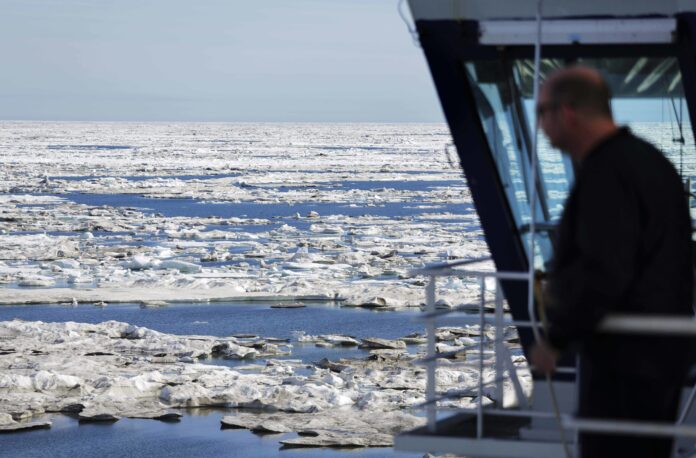The Arctic stands at an “inflection point” as climate change and shifting economic interests lead countries like Russia and China to assert a greater presence in the region.
And that means there will be “wide-ranging implications” for countries like Canada that have pre-existing claims in the Arctic, according to defence and foreign policy officials.
“Russia and China are the state actors that pose the greatest threats to Canadian and other western interests in the Arctic,” said Maj.-Gen. Michael Wright, the Canadian military’s defence intelligence chief.
“With the melting of sea ice, access to the region and associated tactics are increasing and this will have a significant impact on the security situation in the Arctic.”
Read more:
Global response to Russia’s invasion should give China ‘pause’ over Taiwan, defence intel chief says
Wright testified Monday alongside six other leaders from departments including the Department of National Defence and Global Affairs Canada about the country’s Arctic defence and security policies.
In particular, questions put to the officials by senators on the Red Chamber’s national security and defence committee frequently focused on whether Russia’s invasion of Ukraine should signal a growing risk to the security and sovereignty of Arctic countries like Canada.
‘What’s happening in Ukraine is a massive war crime,’ EU foreign affairs chief says
Wright said that while the risks of a Russian incursion into the Arctic appear low, the invasion of Ukraine that began on Feb. 24 has “thrown into question” longstanding assertions by Russian President Vladimir Putin about wanting a peaceful zone in the Arctic.
Russia has been building up its military presence in its Arctic territories over recent years, raising questions about the intent behind the modernizing and re-militarization of former Cold War sites.
Kevin Hamilton, director-general for international security policy with Global Affairs Canada, noted there is potential for “co-operation” between Russia and China — which describes itself as a “near-Arctic state” — in the far north.
Trending Stories
Ontario COVID-19 mask mandate lifts for most settings
China has fully militarized at least 3 islands in South China Sea: U.S. admiral
“China may indeed seek to leverage a lot of the new infrastructure the Russians have built in their High Arctic,” said Hamilton. “So we see the two countries as distinct and having distinct interests, but there are areas of convergence that we’re concerned about.”
He added modernizing NORAD and enhancing Canada’s surveillance capabilities are measures that “we hope will put us in better stead,” as Wright warned that Canada and other Arctic allies “need to keep up with them” on investments in the region.
Hamilton said the invasion by Russia of Ukraine hasn’t changed Canada’s “military analysis” for the Arctic, but it does raise questions.
“It does make us have a second thought of Russia’s view of the world, and Putin’s intent. He’s made it very clear he is running a regime that is expansionist,” Hamilton told the senators.
“That is something we have to be worried about not just in the European context but also in respect to our own Arctic.”
West watches closely as Putin issues chilling message about ‘purge’ of society
Defence Minister Anita Anand is expected to announce what her office described last week as a “robust package” of funding with details on how Canada will work with the U.S. to modernize NORAD.
NORAD, the acronym for the North American Aerospace Defense Command, is led jointly by Canada and the U.S. The joint command is aimed at ensuring continental defence from threats to the shared security of both countries, and includes a northern warning system for territorial incursions.
In August 2021, defence officials from Canada and the U.S. issued a joint statement on the vision for the future of NORAD, and reaffirmed the core goal to “detect, deter, and defend against aerospace threats and to detect maritime threats to North America, today and in the future.”
That joint statement also included a pledge to “upgrade and modernize the infrastructure required to support robust NORAD operations, including in our Arctic and northern regions.”
What that looks like, though, has remained unclear.
In recent weeks though, the federal government has signalled it is eyeing potential spending boosts for the military in the upcoming spring budget.
Russia’s invasion of Ukraine has been cited as a key factor in those considerations.
Both Prime Minister Justin Trudeau and Deputy Prime Minister Chrystia Freeland frequently describe the threat posed by the invasion of a sovereign democracy as an existential threat to Canada’s security.
Trudeau will be taking part in meetings with leaders of the NATO military alliance in Europe this week, with conversations expected about possible increases in defence spending and additional measures to support Ukraine. Those talks are also expected to focus on questions about how the alliance will prepare for future threats beyond Ukraine.
The Arctic is often referred to as NATO’s “northern flank.”
© 2022 Global News, a division of Corus Entertainment Inc.



